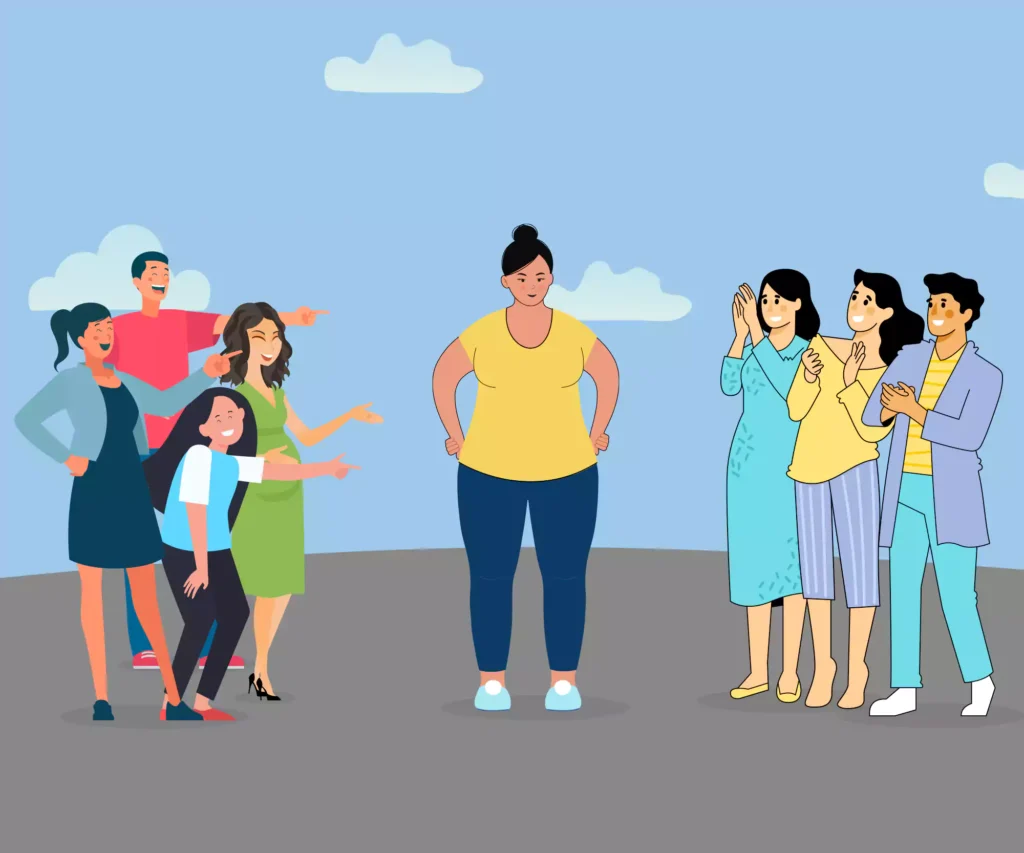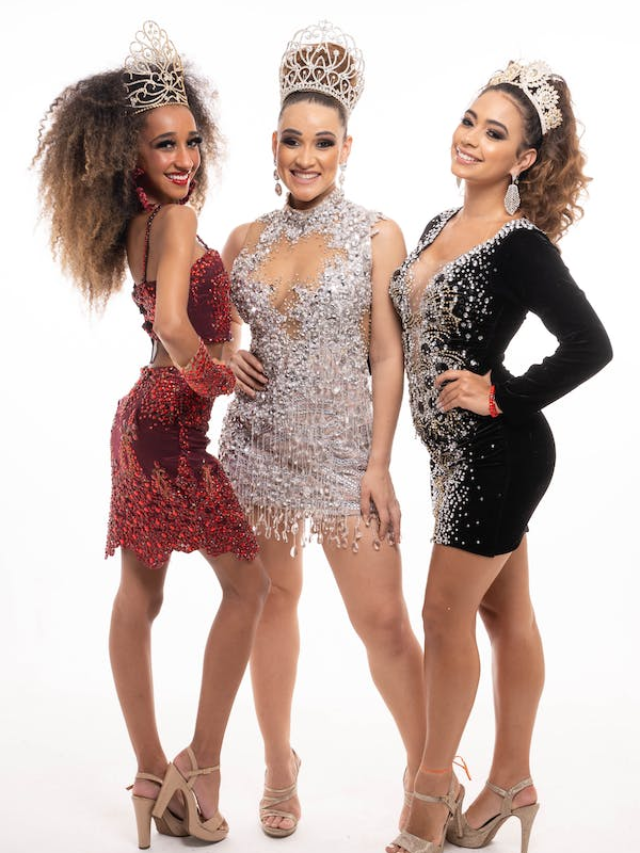“Men don’t like just skin and bones.”
“If you can’t fit into that dress, it means you have a lot of weight-watching to do.”
“Are you really going for a second helping?”
Raise your hand if you’ve ever heard any of the above comments.
This kind of snarky attitude and discrimination based on size, weight, and height can cost women jobs, opportunities, and everyday privileges. Prejudices abound on both sides: fat women are lazy, while thin women are anorexic. When it comes to the female body, all of these prejudices become amplified. Let’s explore the ways in which such prejudices manifest themselves through body shaming and body positivity.
Body shaming, the #1 barrier to body positivity
Standup comedians like Bill Burr and Bill Maher have often slammed overweight people in their content. One of their punchlines is actually ‘Lay off the doughnuts!’. They insist that fat people can be shamed into shedding weight.
So naturally, many were thankful for James Corden’s retort to this ridiculous thinking.
Reminding overweight individuals they are heavy because they eat too much is like telling Madonna her music is often poppy. People who struggle with weight loss are well aware of their lifestyle and choices. Moreover, they fight an everyday battle with self-esteem. They do not need body-shaming attacks to make their lives worse.
You cannot ‘influence’ your way to body positivity
In the day and age of the social media storm, appearances are everything. But have you looked at it closely enough to identify the irony? So many TikTok body positivity accounts have ultimately turned into records of the creator’s hypocrisy regarding their body. When they find they are unable to shed weight as quickly as they want to, they seek bariatric solutions and other similar procedures. Unfortunately, these procedures may not even apply to their case.
The idea of ‘fat acceptance’ has become laughable. This is thanks to influencers who promote unhealthy lifestyles and falsify the real effects of such lifestyles.
On the other hand, platforms like ‘I Weigh’ promote body acceptance. The platform encourages participants to think outside the box of diet culture and approach fitness as a pleasurable activity, rather than as self-punishment. Platforms like this promote body neutrality, which is more realistic than an overhyped, false sense of body positivity. They take into account our multifaceted emotions regarding our bodies and create the space for people to recognise their identity beyond their physique.
When body shaming dons the mask of body positivity
The media feeds us some of the most unrealistic body standards. And that’s an understatement. A celebrity’s real face often gets hidden under million-dollar cosmetic surgeries, high-def contour make-up, and airbrushed filters, which are further photoshopped! There is one household name that comes to most minds when such a description is laid out. Yes, it’s the Kardashians. They run their surgically enhanced bodies through unnatural filters (and even CGI edits on their show, as per some claims). Thus, the image they portray becomes far removed from what they practice. Today’s ideal body is, astonishingly enough, a deranged version of some video game or anime character.
To this day, big roles go to slimmer actors. Even when a fat protagonist is seemingly leading the plot, the representation gets marred by elements of colourism and featurism. Therefore, it defeats the very purpose it supposedly seeks to achieve.
The Indian film industry has prime examples of this. Bollywood’s Ajay Devgn is shown running away from a fat girl in Ho Nahi Sakta. Kollywood’s Vijay appears terrified of his relatively heavier younger sister in Gilli. The ridiculous message that emerges from all these stories is that a fat person always occupies a sub-human status that repulses everyone.
Hollywood is no saint in this issue, either. Remember when Bridget Jones was supposed to be an unpopular, fat, and single woman but was played by the gorgeous Renée Zellweger? Or when they tried to pass off a regular-sized, healthy-looking woman in Love Actually as fat? To top it all off, there were too many fat suits. Just think back to every Eddie Murphy movie where he played multiple characters, Fat Monica from Friends or Gwyneth Paltrow in Shallow Hal or Kaley Cuoco in To Be Fat Like Me. They were all thin folk in stuffy costumes. In Paltrow’s case, the actress even stated that she was treated very differently in the fat suit than otherwise. She called the experience “so sad, so disturbing”.
The ugliness behind ‘pretty privilege’
On the flip side is a different world altogether. People whose looks seem agreeable to certain beauty norms experience what is known as ‘pretty privilege’. They get to cut lines, accept free drinks, and all kinds of favours are offered to them ‘on the house’.
This concept has its roots in the idea that pretty people, particularly women, get amenities and opportunities. These perks are not afforded to those who don’t fit into traditional beauty norms. It all boils down to what is considered ‘pretty’. Often, this is how ‘pretty’ is measured: the closer your features and body are to Eurocentric beauty standards, the prettier you must be. In Norbit, for instance, the titular character’s wife is fat, mean, loud and undesirable—the only way she could get a man to love her is through brute force. Meanwhile, his childhood sweetheart is a very slender, light-skinned, ‘pretty’ woman.
And then, each culture has its own idea of beauty. Even so, when different cultures interact, these ideals overlap and become even more complicated. K-pop bodies, for instance, are all 50 kgs or less. Whether this is due to genetics, a diet rich in vegetables, or unhealthy crash diets, many may find this kind of body unattainable.
Stop casting the fat girl as the sidekick
It is tiring how often we see that the fat girl onscreen is an afterthought in the movie. She is someone who is so invested in her slender friend’s ‘happily ever after’. Additionally, she doesn’t even consider herself worthy of one. Filmmakers of such stories often think that portraying her as quirky, funny, and quick-witted is enough. However, it doesn’t take long to realise these qualities are meant to make the fat girl less of a competition to the slimmer main character.
Take, for instance, the main character from Kabir Singh, who says in that cringe-worthy line, “fat girls and pretty girls go well together.” Lines like this assume that a fat girl cannot simultaneously be attractive. Additionally, it implies that for female friendships to work, one of the girls should be perceived as physically unappealing. This is based on the premise that women always compete with each other. The Fat Amys of the movie world are good for a laugh but not for the lead.
The few and far instances where the fat girl does deserve love only happen when the guy hits his head, and her inner beauty, i.e. skinniness, is exposed to his eyes alone (like in Shallow Hal). Or unless the fat girl hits her own head like in I Feel Pretty. Or unless someone else hits the fat girl in the head like in Isn’t It Romantic?. Seriously, Hollywood, how many more mainstream movies about being hit in the head in order to find attractiveness can we expect? Are you not tired?
The right kind of makeover
Movies need to spotlight more characters who are confident regardless of the way they look. We need more roles that go along the lines of Donna Meagle from Parks and Recreation or Olive from Little Miss Sunshine. Movies also need to wake up to the fact that fat characters can be dynamic too. They can be just as flawed, vile, and complex as characters of any other body type.
In the real world, the movement towards body acceptance must shed its airs and airbrush and embrace actual truth. In the place of irresponsible lifestyles, we need to be able to see what healthy choices actually look like. Surprisingly, they could be more time-consuming and less glamorous. In due course (which cannot be sooner, by the way), honest representations will help us remember to be kind to our body and carry it with the dignity it deserves.


